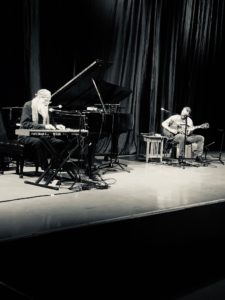 On Saturday, February 1, 2020 the Shannon Center for the Performing Arts at Whittier College staged a concert titled Terry Riley with Gyan Riley – Live at 85. Featuring one of the founding fathers of classic minimalism – now in his 85th year – along with his talented son Gyan, this concert was a chance to catch up on the current output of the innovative composer of In C. The Shannon Center was the perfect venue for the two musicians who filled the stage with keyboards, synthesizers, guitars plus assorted amplifiers and speakers.
On Saturday, February 1, 2020 the Shannon Center for the Performing Arts at Whittier College staged a concert titled Terry Riley with Gyan Riley – Live at 85. Featuring one of the founding fathers of classic minimalism – now in his 85th year – along with his talented son Gyan, this concert was a chance to catch up on the current output of the innovative composer of In C. The Shannon Center was the perfect venue for the two musicians who filled the stage with keyboards, synthesizers, guitars plus assorted amplifiers and speakers.
There was no printed concert order and the music simply began. What must have been several pieces were played sequentially, without a break. The opening phrases were a series of intriguing piano arpeggios thoughtfully played by the senior Riley, and the guitar soon entered underneath with a soft, relaxed feel. From this amiable beginning, the playing varied over a remarkably wide musical palate. There were suggestions of jazz, boogie and the blues along with splashes of the mystical, Asian and other exotic influences. A continuous stream of animated phrases kept things lively and engaging. This was all played from memory – or perhaps by improvisation – and the finesse of the elder Riley on the piano was extraordinary. Terry seemed to know exactly where he wanted to go and there were times when Gyan had to be on the alert to keep up. The interplay between the two was often intricate and complex, but always coherent and connected. A booming crescendo marked the end of this first section of the concert and this was received with a round of strong applause.
The second set was something completely different. Terry Riley switched from keyboard to an electronic synthesizer operated from an iPad. Gyan continued with guitar, but with a heavily processed sound. The beginning sounds were mysterious and liquid, consisting mostly of sustained tones. The synthesizer notes had a bell-like quality that evoked a feeling of calmness and serenity. The guitar produced notes with a gathering velocity until there was a distinctly frenetic feel to the texture. The synthesizer contributed a series of increasingly alien sounds that added to the frenzy. The elder Riley proved to be especially adept in generating the kinds of sounds he wanted from the iPad. Typically, the electronic sounds dominated while at other times strongly melodic passages were heard from the guitar. The general disarray of the sounds gained strength, concluding in a great crescendo complete with the realistic wail of a siren. This piece would have easily fit right in with any from the more experimental electronic groups here in town. Clearly the Rileys were not creating music for the past.
The third set of the concert had Terry Riley seated at a keyboard synthesizer with Gyan’s electric guitar, now producing a more conventional sound in the introductory riffs. Warm chords from the synthesizer entered and the result was a soothing contrast from the previous piece. Perhaps more remarkable was the voice of the elder Riley, credibly singing a slow ballad over the instruments. As the piece proceeded, there was a fine keyboard-guitar duo. Terry now switched back to the piano and more of a jazzy feel predominated along with a solid beat. A short vocal section completed this piece. The final piece on the program opened with a repeating cell in the piano and a solid groove developed as the guitar joined in. The echo of a vintage minimalism was unmistakable, and many in the audience could be seen bobbing their heads and tapping their feet to the beat. The texture turned more complex at the finish, but for those who attended the concert hoping to hear some classic minimalism, the Rileys obliged.
A long and loud round of applause brought the Rileys back on stage for an encore, and this featured some powerful chords from the synthesizer along with some nice counterpoint from the guitar. Once again a satisfying groove was heard, and the big sound filled the space at the finish. A standing ovation followed.
Terry Riley is one of the more influential composers of the mid twentieth century, but like any artist he has evolved over the last 55 or so years since In C. This concert provided something for everyone: a variety of accessible and wide-ranging music, something new and cutting edge, and a nod to his roots in classical minimalism. Watching the Rileys, you could sense that they very much enjoyed the opportunity to perform together. Terry Riley seemed to have a permanent smile on his face and was generous with his time for his fans in the lobby after the concert. Gyan was also very personable – despite having traveled all day across three time zones. And why not? Seeing father and son performing together made for an evening of great music, with Terry vital, creative and alive at 85.
